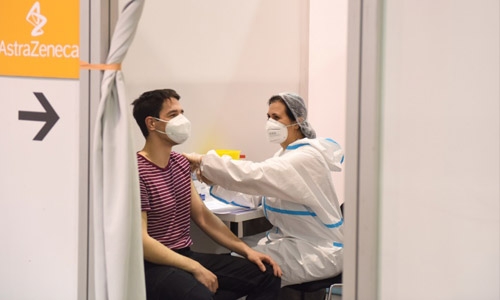EU regulator backs AstraZeneca jab
Agencies | Brussels
The Daily Tribune – www.newsofbahrain.com
Experts who argue that the coronavirus vaccine developed by AstraZeneca and Oxford University is safe - and certainly safer than getting Covid-19 - circled their wagons on Tuesday, but not before more countries suspended the jab.
The European Medicines Agency (EMA) - which approved the vaccine in January - remains convinced of the safety of AstraZeneca's product, the organization's chief said, Deutsche press agency (dpa) reported.
"A situation like this is not unexpected," executive director Emer Cooke said, referring to several cases of blood clots that had reportedly developed following an injection. "When you vaccinate millions of people, it's inevitable that you have rare or serious incidences of illnesses that occur after vaccination."
Fear has been spreading about the jab as more countries report incidences of blood clots in people after receiving a vaccination. Now, several European countries have shelved the product, complicating already troubled vaccination drives.
The rate of reported blood clots amongst vaccinated people seemed to broadly mirror the rate in the general population, Cooke explained. The agency had also received similar numbers from other vaccines from across the world, she said.
However, EMA had launched a "very rigorous analysis" to determine whether the vaccines might have caused the events, she said.
While there was speculation as to whether specific batches might have caused the blood clots, this seems "unlikely," Cooke said, adding that the agency would present its findings on Thursday.
"We are still firmly convinced that the benefits of the AstraZeneca vaccine in preventing Covid-19 with its associated risk of hospitalization and death outweigh the risk of these side effects," she said.
Cyprus, Latvia, Luxembourg, Portugal, Sweden and Venezuela on Tuesday joined the list of countries suspending the use of the AstraZeneca jab. Those announcements came on top of previous ones from Denmark, France, Germany, Ireland, Italy, the Netherlands, Norway and Spain.
Lithuania had said it would keep using the shot, before suspending its use later on Tuesday. There were three reports of blood clots in the country, the prime minister said.
A comparatively shorter list of countries stuck by AstraZeneca's jab on Tuesday, including Estonia. Thailand was another, and Prime Minister Prayuth Chan-ocha made a point of getting vaccinated before the cameras on Tuesday, to inspire confidence in the shot.
By Tuesday evening, leaders from France and Italy said they were preparing to swiftly recommence vaccinations after the EMA's review.
French President Emmanuel Macron and Italian Prime Minister Mario Draghi said the suspension of vaccinations in their countries was a "temporary, precautionary measure," in a joint statement issued following talks.
In Italy, the suspension may have cost the country's vaccine rollout four days, according to sources close to the government's pandemic crisis team.
If the country starts using the AstraZeneca jab again on March 18, the pandemic commissioner Francesco Paolo Figliuolo's team said Italy could catch up within a "few weeks" - thanks in part to an estimated 708,000 more doses of the Pfizer/BioNTech jab.
Countries that suspended vaccinations using the AstraZeneca shot may have fallen victim to a media-induced panic that could be a result of misinformation, a Polish government official responsible for the country's vaccination campaign said.
"It is possible that we are dealing here with a planned disinformation campaign and a brutal fight of medical firms," Michal Dworczyk told PAP agency on Tuesday.
"It is worth remembering that, apart from firms registered in the EU, Britain and the US, there are other firms that are striving to have their vaccines used," the official said.
To date, neither the European Medicines Agency nor domestic Polish institutions responsible for medicines safety have recommended suspending the use of the jab, he noted. Poland continues vaccinations with AstraZeneca.
Alongside the EMA, national health authorities in several countries have launched investigations.
Later on Tuesday, the Portuguese health minister said it trusted the EMA completely, and was waiting for the regulator's assessment before deciding what to do.
The British vaccine regulator said the vaccine, which AstraZeneca developed in partnership with Oxford University, is not responsible for blood clotting, based on available evidence.
Meanwhile experts sharply criticized the countries' decision to suspend the roll-out of the AstraZeneca vaccine.
"I think it is a disaster for the vaccination uptake in Europe, which is already on slightly unsteady ground in some countries," Peter Openshaw, a professor of experimental medicine at London's Imperial College, told the BBC on Tuesday.
Related Posts

